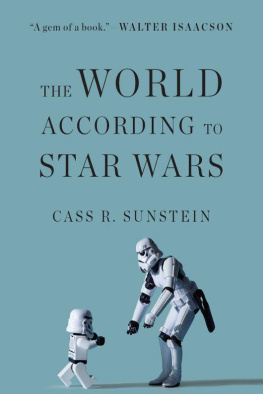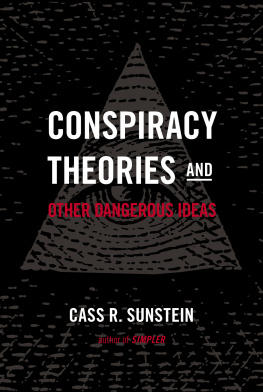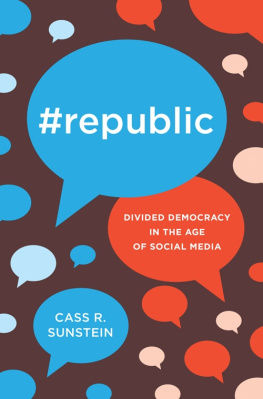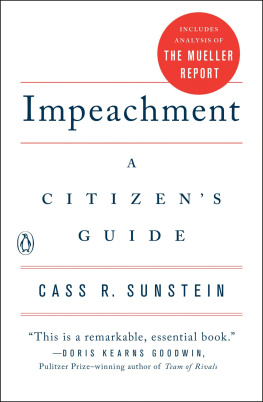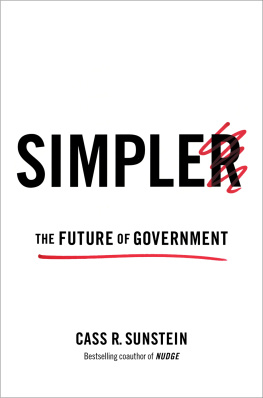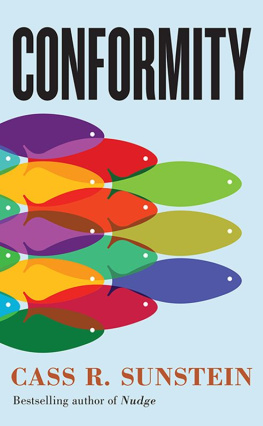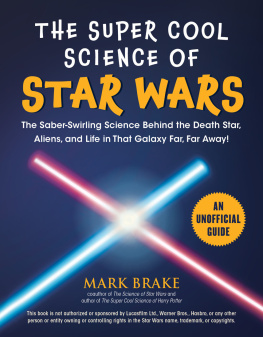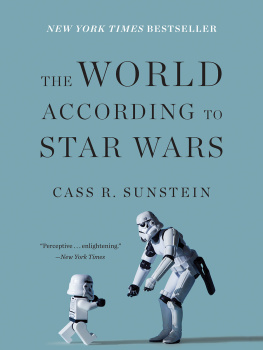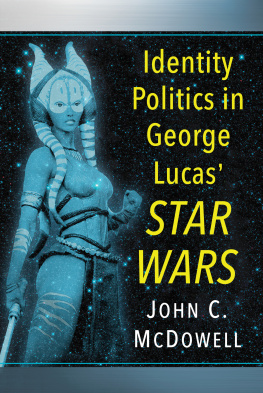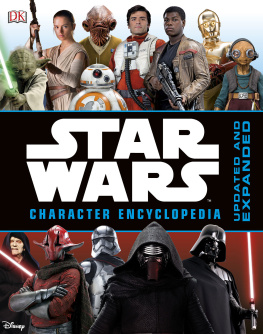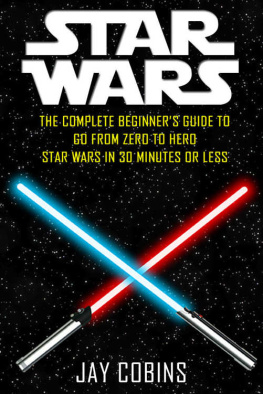
For Declanmy son
Difficult to see. Always in motion is the future.
YODA
Its the biggest adventure you can have,
making up your own life, and its true for everybody.
Its infinite possibility.
LAWRENCE KASDAN
CONTENTS
The human race can be divided into three kinds of people: those who love Star Wars, those who like Star Wars, and those who neither love nor like Star Wars. I have read parts of this book to my wife, emphasizing those that seemed to me especially fun, and one night she finally responded, with some combination of pity and exasperation, Cass, I just dont love Star Wars! (I knew that, I guess, but somehow I forgot.)
When I started this book, I merely liked Star Wars. I have now gone way past the threshold for love. Nonetheless, I intend this book for all three kinds of people.
If you love it, and are sure that Han shot first, and know everything there is to know about parsecs, Biggs, Boba Fett, and General Hux, you still might want to learn about the series unlikely origins, its wildly unanticipated success, and what it really has to say about fathers, freedom, and redemption. If you merely like the movies, you might be interested to know their distinctive claims about destiny, heroic journeys, and making the right choice when the chips are down.
If you really dont like Star Wars, and cant tell an Ackbar from a Finn or a Windu, you might still be curious about how it became such a cultural phenomenon, and about why its so resonant, and why its appeal is enduring, and how it illuminates childhood, the complicated relationship between good and evil, rebellions, political change, and constitutional law.
In his wild fever-dream Auguries of Innocence, William Blake wrote of seeing a World in a Grain of Sand. Star Wars is a grain of sand; it contains a whole world.
All the gods, all the heavens, all the hells, are within you.
JOSEPH CAMPBELL
As of early 2016, the Star Wars franchise had earned about $30.2 billion. Of that amount, $6.25 billion came from box office, nearly $2 billion from books, and about $12 billion from toys. The total exceeds the gross domestic product of about ninety of the worlds nations, including Iceland, Jamaica, Armenia, Laos, and Guyana. Suppose that Star Wars was a nation and that its earnings were its GDP. If so, it would be ranked right around the middle of the 193 nations on the planet. Doesnt it deserve its own seat at the United Nations?
Moreover, its earnings are rapidly climbing. With the spectacular success of The Force Awakens, theyre exploding.
The numbers do not come close to telling the tale. Quantify everything you cannot. (Didnt Yoda say that?) In terms of politics and culture, Star Wars is everywhere. In the 1980s, Ronald Reagans Strategic Defense Initiative was commonly called Star Wars. After the appearance of The Force Awakens in December 2015, President Barack Obama closed a news conference this way: Okay, everybody, I gotta get to Star Wars. In the same week, Hillary Clinton ended the national Democratic debate with the words, May the Force be with you.
Also in that week, Republican candidate Ted Cruz tweeted, The Force... its calling to you. Just let it in and tune in to tonights #CNNDebate. Drawing on westerns and 1960s comic books, committed to liberty, and audacious about hope, Star Wars is bipartisan and all-American.
At the same time, its appeal is universal; obsession with the series is hardly limited to the United States. In late 2015, I traveled to Taiwan to give a series of lectures and to meet with the nations president and its Constitutional Court. We discussed human rights, regulation, the world economy, and Taiwans complex relationship with China. But everyone also wanted to talk about Star Wars. The saga is big in France, Germany, Italy, Nigeria, and the United Kingdom. They love it in Israel, Egypt, and Japan, and its successfully invaded India, too. Until 2015, it wasnt allowed to be shown in China, but the Force has now awakened there as well.
In all of human history, theres never been a phenomenon like Star Wars. Fueled by social media, the whole series has a cultlike following, except that the cult is so large that it transcends the term. Its humanity, just about. A recent Google search of Star Wars produced 728 million results. By contrast, Beatles produced 107 million, Shakespeare 119 million, Abraham Lincoln 69 million, Steve Jobs 323 million, and Taylor Swift 232 million. As evidence of its adaptability, consider the first entry turned up by a Twitter search: Destroy hunger with Star Wars Death Star peanut butter cup.
Okay, maybe you dont love Star Wars, or even like it. Whether or not you consider yourself a fan, you probably know a lot about the movies. You know about the Force, dont you? Youve heard of Darth Vader? Might you confess that in the toughest times, youve sometimes thought to yourself, in your heart of hearts, Help me, Obi-Wan Kenobi, youre my only hope?
Star Wars unifies people. You can live in Berlin or New York, London or San Francisco, Seattle or Paris, and youll probably recognize Darth Vader, and you might well know what the Millennium Falcon is. (You do, dont you?) In 2015, the United States and Russia were not especially friendly; there was a great deal of tension between Vladimir Putin and Barack Obama. But when The Force Awakens came out, a high-level Russian official told me, with a bright, boyish smile and something like an acknowledgment of common humanity, that the series is truly beloved in his country, and that just about everyone there has seen it.
Star Wars also connects generations. My three-year-old daughter, named Rian, really likes Darth Vader. My six-year-old son, named Declan, loves to wield his lightsaber. I also have a grown daughter, named Ellyn, with whom I saw the first two trilogiesstarting, I think, when she was around seven years old. She texted me these words, right after seeing The Force Awakens: I burst into tears right in the opening credits.... First time we didnt go together!
My own parents are long gone, but my mother, a science fiction buff, adored the first movie, Star Wars, released in 1977 (and later retitled A New Hope ). It seemed a little more confusing to my father, a naval officer in World War II, stationed in the Pacific in the 1940s, who knew how to handle a gun (he fought in the Clone Wars, kind of). My dad loved tennis, cars, and fishingnot so much lightsabers and droids. But he was game for anything, and he saw the movies charm. Healthy as a Wookie, he was stricken with brain cancer in his early sixties, and he died young, just four years after A New Hope was released. He never had a chance to meet Ellyn, Declan, or Rian.
Different cultures have different rituals and traditions. Theres Santa Claus, of course, and the Easter Bunny, and the Tooth Fairy. But nothing quite compares to sitting with a young child for her first viewing of Star Wars. As the lights come down, and those beloved golden letters fill the screen, and John Williamss familiar music announces whats coming, theres awe and wonder. Plenty of ghosts enter the room. Its good to see them. Star Wars brings back the dead.
STAR WARS IS OUR MODERN MYTH
When A New Hope was released, most insiders thought that it would be a disaster. The studio had no faith in it. Almost nobody liked it. The actors thought that it was ridiculous. George Lucas, its creator, feared catastrophe. All this raises some questions: Why has Star Wars turned out to be such a spectacular success? Is it really awesome? Why is its appeal so enduring? Why has it become our modern myth? What does it have to teach us ? About culture, psychology, freedom, history, economics, rebellion, human behavior, and law? About the human heart?
Next page
